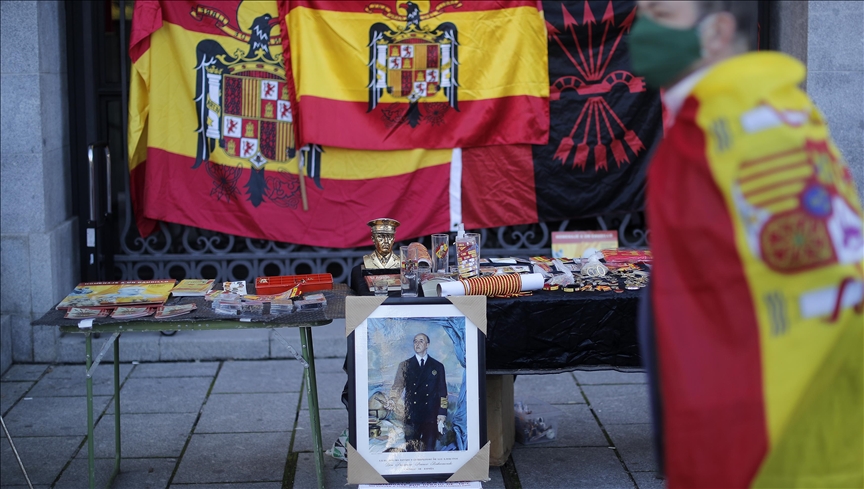Spain kicks off commemorations marking half a century since Francisco Franco’s death
The former Spanish dictator died in November 1975 after 36 years in power
 Supporters of Franco gather to commemorate the 45th anniversary of Spain's former dictator General Francisco Franco's death at Plaza de Oriente on November 22, 2020
Supporters of Franco gather to commemorate the 45th anniversary of Spain's former dictator General Francisco Franco's death at Plaza de Oriente on November 22, 2020
OVIEDO, Spain
The Spanish government commemorated 50 years since the death of the fascist dictator Francisco Franco in the first of many events on Wednesday.
Franco died on Nov. 20, 1975, and the government plans to use the entire year to celebrate the country’s transition to democracy.
Spanish Prime Minister Pedro Sanchez delivered a speech at Wednesday’s first event, held at the Reina Sofia art museum in Madrid, emphasizing the importance of reflecting on the past.
“We will celebrate that in 1975, at a time of great political uncertainty, Spanish society decided to opt for democracy and freedom,” Sanchez said. “No country started from so far behind and advanced as quickly as democratic Spain.”
“Those who sing the virtues of authoritarianism want us to forget that an autocratic and repressive minority still governed Spain in the 1970s.”
The Socialist prime minister also warned of the risks of backsliding.
“If history teaches us anything, it’s that freedom is never permanent. It can be lost, as happened last century when 14 of the world’s 24 democracies became dictatorships and the rights of one in six Europeans were curtailed,” Sánchez said.
He added that Spain’s 36 years of fascist rule should be viewed with sorrow by anyone who claims to believe in democracy.
The ceremony, however, became a flashpoint for political division, with Spain’s right-wing groups refusing to attend.
Jose Antonio Fuster, a spokesperson for the far-right Vox party, said his group would “never oblige anyone to condemn their grandparents,” adding that its members would boycott events imposing what he called “a sole and divisive vision of the past.”
Fuster described the yearlong commemorations as “absurd necrophilia” and accused the government of using them to distract from mismanagement, corruption and a migration crisis.
The more moderate, center-right Popular Party also abstained. In a statement, the party criticized Sanchez for focusing on Franco’s legacy, contrasting it with its own leader’s trip to Valencia to address recovery efforts after October’s deadly floods.
Reflecting on Spain’s fascist past has long been a contentious issue between the country’s political left and right.
One of Sanchez’s early initiatives as prime minister was the 2019 exhumation of Franco’s remains from a massive mausoleum, where supporters had continued to honor him. Franco’s body was reburied in a more humble cemetery alongside his wife.
In 2022, Sanchez’s government enacted the Law of Democratic Memory, allocating more resources to identify victims of the Spanish Civil War and dictatorship, revising school curricula, and imposing fines for promoting fascist symbols or humiliating victims of fascism.
According to the Spanish historian Jose Alvarez Junco, Franco’s regime executed around 40,000 people during times of peace.
During the Spanish Civil War, which was triggered by a fascist-led coup in 1936, an estimated 540,000 people lost their lives, according to Spanish daily El Pais.
Many of the victims were buried in mass graves and have still not been exhumed or identified.


